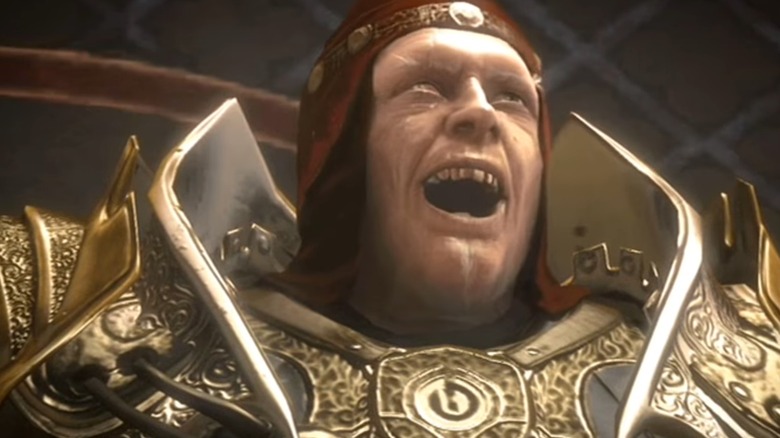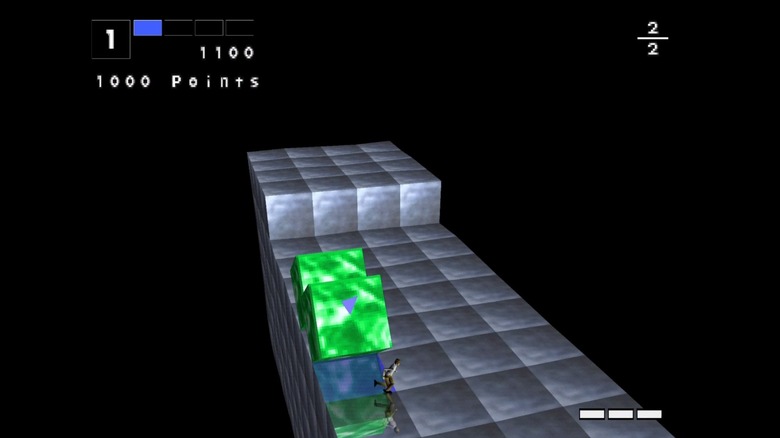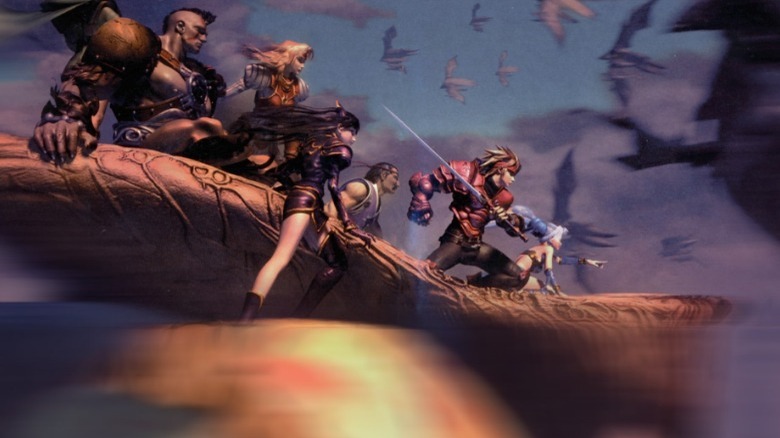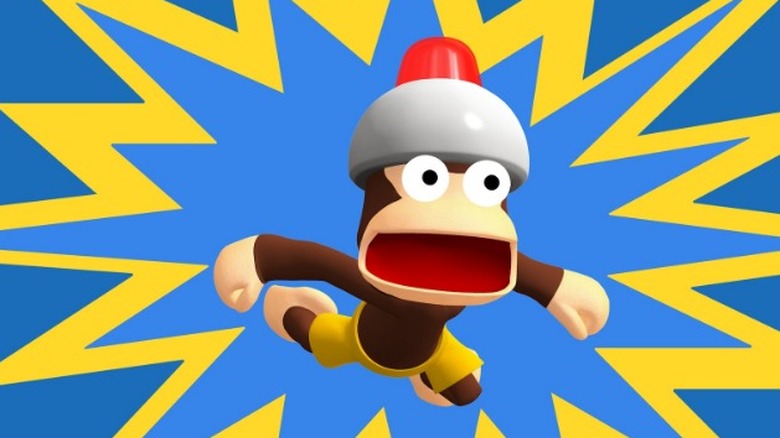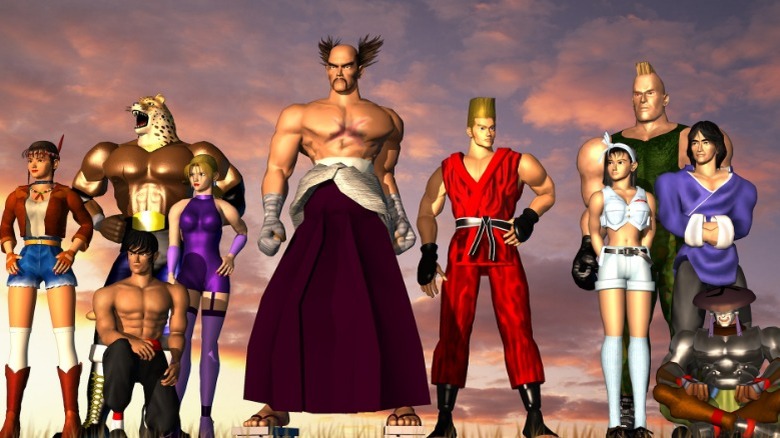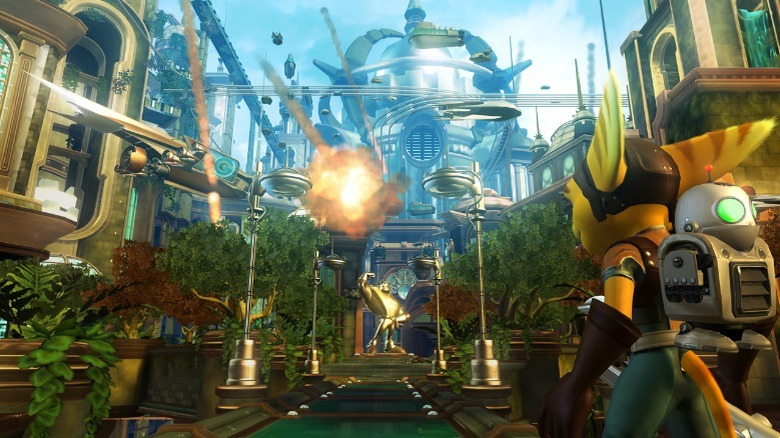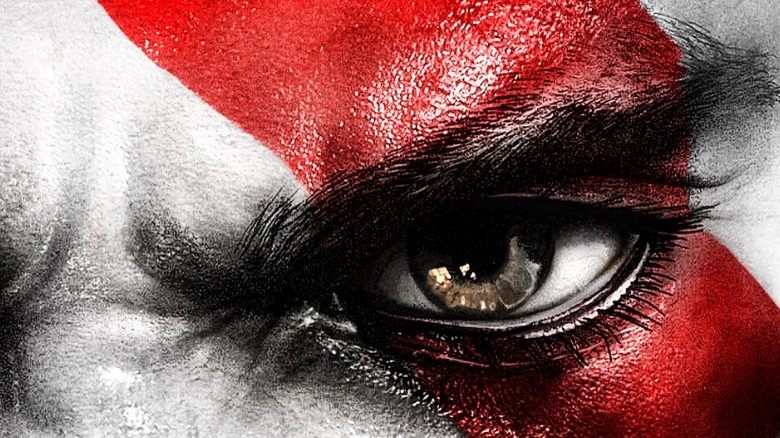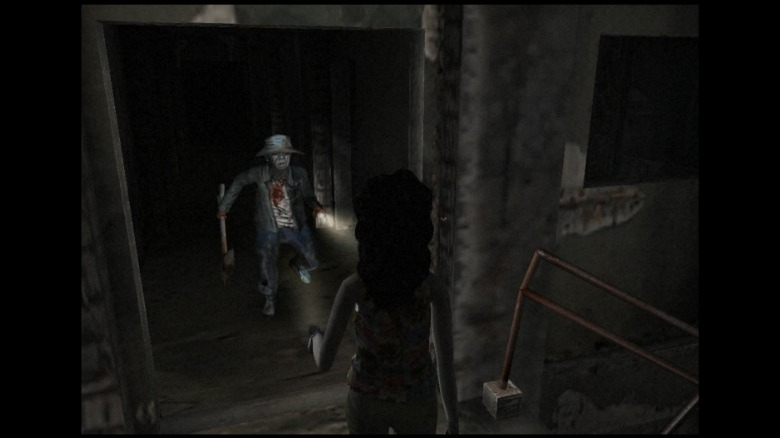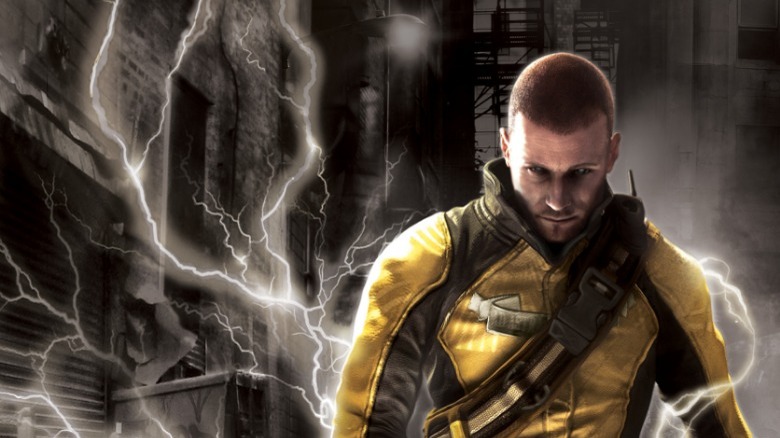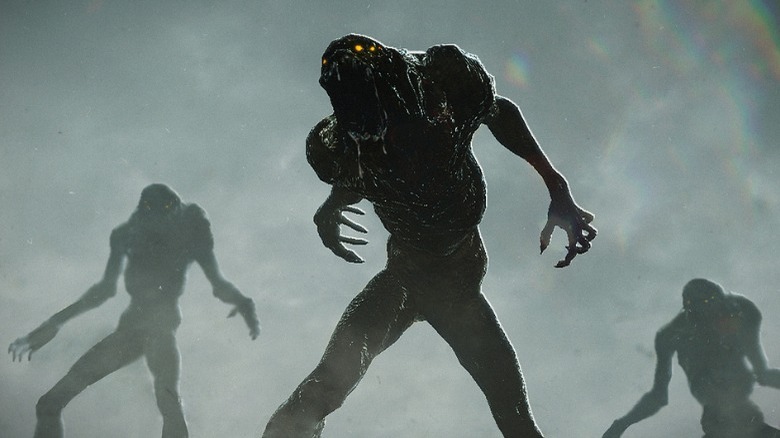12 Retro PlayStation Exclusives Worth Playing On PS4 And PS5
Modern video games are amazing; no ifs, ands, or buts. Many current titles blur the line between the real and polygonal, and many more fill their worlds with tiny details and deviously intelligent programming to make their NPCs come to life. Granted, these advances are only possible thanks to ballooning file sizes and SSDs that can support them, but that only demonstrates how far video games have come. Then again, sometimes we need a breather from the modern and need to step back to a simpler time, back when developers didn't have decades of experience and had to circumvent programming and memory limitations with creative designs.
Retro gaming is a huge deal these days. Developers seemingly spend more and more time porting old titles — and sometimes remaking and remastering them — to new consoles. And when a gamer wants to play something that hasn't been ported, they pay out the nose for old titles and consoles that can still run them. Platforms such as Xbox and PC are built and advertised on the ability to support modern and retro titles (i.e., backwards compatibility), but not the PlayStation. Sony primarily looks toward a future powered by SSDs and ray tracing, but every now and then, if the planets align during a blue moon, Sony might port an old PlayStation 1, 2, or even PlayStation 3 title to the PlayStation 4 or 5. Here are some of the best old games that you can play on modern PlayStation consoles and nowhere else.
I.Q. Intelligent Qube
These days, puzzle games need a narrative hook or an explorable world of some kind. That isn't a knock against modern game design, just an observation. But you can revisit the old days when puzzle games relied on their puzzles and nothing else with "I.Q. Intelligent Qube."
As you can probably guess by the game's intentionally misspelled name, "I.Q. Intelligent Qube" is a game that tests your IQ with cubes. The goal is simple: lay traps to capture moving blocks. Capture as many white ones as you can, and if you catch a green cube, you can lay a larger trap to secure multiple cubes at once. But don't capture the black ones unless you want less room to maneuver. Repeat until you eventually win, or more likely fall off the stage or get crushed by roaming blocks.
"I.Q. Intelligent Qube" is as addictive as it is simple. The game tests players' reflexes and abilities to think and plan under pressure. Each time they fail, "I.Q. Intelligent Qube" essentially encourages gamers to try again, not only to last longer but also to beat their previous high score. The game also includes a Vs. mode that lets players take turns to prove who has the biggest brain in the room.
You can easily purchase "I.Q. Intelligent Qube" on the PlayStation storefront, but the game also comes as part of the PlayStation Classic plug-and-play console.
The Legend of Dragoon
Few video games have been as influential as "Final Fantasy VII." After that game launched on the original PlayStation, almost every game publisher wanted their own "Final Fantasy"-killer. "The Legend of Dragoon" was Sony's attempt to overthrow the title it helped popularize.
"The Legend of Dragoon" is the dictionary definition of a cult classic. While the game didn't wow audiences at launch, gamers have warmed up to it ever since and have demanded remakes, remasters, and everything in between. The game stars Dart, a young man stuck in the middle of a war between two nations. What begins as a simple quest to retrieve Dart's childhood friend from an invading army, in typical JRPG fashion, spirals into a journey that decides the very fate of the world. Very "First Chapter: Retrieve a lost cat, Final Chapter: Kill god."
While "The Legend of Dragoon" sports a well-told and deep story full of surprising plot twists and likable characters, the game stands out thanks to its combat system. Many attacks rely on simple QTEs that force players to pay attention during fights, but successful hits also build up points necessary to use the game's titular Dragoon armor. These super-powerful transformations can turn the tide of battle with stat buffs and new skills, but they are also double-edged swords since they sacrifice the ability to defend and use items. Given the legacy of "The Legend of Dragoon," it's surprising that few if any games have copied these systems.
While "The Legend of Dragoon" has mostly toiled away in relative obscurity, Sony recently added it to the PlayStation store.
Ape Escape/Ape Escape 2
When Sony released the PlayStation, the console's controllers didn't have analog sticks; the iconic Dual Analog design (which was eventually replaced by the Dualshock) didn't appear on store shelves for several years. True to its name — and unlike the PlayStation's main rival, the Nintendo 64 — the Dual Analogshock sported two sticks instead of one. To demonstrate the power and advantages of this unique design, Sony greenlit an entire game franchise.
"Ape Escape" is, at its core, a mascot collectathon, except instead of playing as a mascot collecting tons of items, gamers control a kid collecting the mascots. The premise of each "Ape Escape" game can be boiled down to "A bunch of apes got their hands on intelligence-enhancing helmets, and it's your job to get them back." But nobody plays an "Ape Escape" game for the story.
Gameplaywise, "Ape Escape" titles are polished if by the book, collectathons. You go around different levels collecting apes, acquiring upgrades, using them to catch even more apes, and repeating until you win. Each level revolves around a unique theme and gimmick, but what makes "Ape Escape" special, at least at the time of launch, is its control scheme. The left analog stick controls the character while the right stick controls aiming. This system is standard nowadays, but when "Ape Escape" was released, it was revolutionary.
Both "Ape Escape" and its sequel, "Ape Escape 2," are available through the PlayStation store. However, a warning for PlayStation 5 owners: according to some gamers on Reddit "Ape Escape 2" was broken on the PS5, but according to more gamers on GameFAQs, its texture problems might have been fixed.
Tekken 2
Fighting games rarely get it right the first time. "Street Fighter" infamously needed a sequel before it found its footing, and while "Tekken" released late enough to learn from existing fighting franchises, it too required a sequel before it got things right.
"Tekken 2" is, quite predictably, a sequel to the original "Tekken." The game has a story, but as with most fighting games, it's little more than an excuse to pit fighters of every culture and combat style against one another. As is fighting game tradition, the roster of "Tekken 2" is bigger than its predecessor. "Tekken 2" even introduced several fan-favorite characters, including Roger the boxing kangaroo and his pallet swap, Alex the boxing velociraptor.
Despite releasing a year after "Tekken" and on the same console, "Tekken 2" is an upgrade in every conceivable way. Enemy AI is smarter; controls are more polished and forgiving, and players have more modes to work with. Moreover, character models are more detailed, and the music is arguably some of the best in the franchise, but these pale in comparison to the new moves and combos. Unlike in "Tekken," fighters can now sidestep to avoid attacks, back throw opponents for massive damage, and counter blows with reversals. These improvements paved the way for even more changes and upgrades in subsequent "Tekken" titles.
While you can find "Tekken 2" on the PlayStation digital storefront, the game is only available via a PlayStation Plus Premium subscription.
Ico
Are video games art? Audiences and critics alike have asked this question for years, but nobody seems to know the answer. Unless they play "Ico," that is.
In "Ico," players control the titular Ico, a horned boy who has been imprisoned in a crumbling castle, and the goal couldn't be simpler: escape. To do so, however, Ico has to rely on, lead, and protect the mysterious girl Yorda. While the overarching plot is simple, "Ico" is more about making players connect to the characters and their growing relationship, even though they speak two different languages.
The lifeblood of "Ico" is its world. The game's castle is a sight to behold, even taking the PlayStation 2's weak hardware into consideration. Moreover, "Ico" uses environmental cues and designs to tell a story and also weaves in puzzles that don't feel out of place in a decrepit castle. While "Ico" is one big escort mission, the game is an escort mission done right since Ico's and Yorda's skills complement each other. But in a stroke of genius, each ability also tells audiences more about the characters without dialogue. Then again, since Ico and Yorda can't understand each other, "Ico" uses the simple act of holding hands to bridge the language barrier and also smooth out gameplay. "Ico" does so much with so little.
Currently, "Ico" is only available through PS Plus Premium.
Ratchet & Clank Series
The dynamic duo is a popular trope in works of fiction. Everyone has their favorite, be it Thelma and Louise, Frodo and Samwise, Batman and Robin, or Sherlock Holmes and Dr. Watson. However, none of these hold a candle to one of the longest-running dynamic duos of all time, Ratchet and Clank.
The "Ratchet & Clank" series stars the short furry alien Ratchet and his robot buddy Clank. Each entry is about their various adventures and misadventures across the galaxy. While stories are generally comedic and self-contained, we would be lying if we said the franchise is devoid of drama or continuity. While you are by no means obligated to play every "Ratchet & Clank" game in order, many plot twists target longtime veterans who have been with the characters for years.
Despite the main characters' seemingly cuddly designs, "Ratchet & Clank" games are all about the guns. The franchise mostly consists of third-person platformer shooters, and each entry emphasizes bombastic action punctuated by cartoonishly creative cannons. The better audiences play, the more firearms and upgrades they can unlock, and in all honesty, while the series is called "Ratchet & Clank," the guns are the main stars. What's not to love about a mine filled with killer bees?
PS Plus Premium offers every main entry in the "Ratchet & Clank" series, from the PS2 original remastered for PS3 to "Ratchet & Clank: Into the Nexus." The subscription service also includes the spin-offs "Ratchet & Clank: Full Frontal Assault" and "All 4 One."
God of War Original Trilogy
Before "God of War" was a series about a man trying to raise his son while waging war against most of the Norse pantheon, "God of War" was a series about a man seeking revenge by waging a one-man war against the entire Greek pantheon. The more things change, the more they stay the same.
The original "God of War" trilogy — and by extension its spin-offs — takes place long before Kratos found himself in the land of Midgard. The game chronicles Kratos' story several years after he sold his loyalty/soul to Ares for power and was tricked into killing his wife and daughter. What begins as a journey to forget his past is twisted into revenge, and Kratos lashes out at everyone around him and is constantly betrayed as a result. Essentially, the trilogy is a Greek tragedy powered by PlayStation.
"God of War" and its sequels are products of their time: mechanically simple hack-and-slash titles. However, what the games lack in complexity, they make up for with sheer spectacle. Combat in each entry is as fast as it is brutal, and every level is a treat for the eyes and ears thanks to excellent art direction, a godly sense of scale, and a soundtrack of epic proportions. Also, we can't forget that each "God of War" pushed the limits of their mature ESRB ratings thanks to visceral executions and off-screen sex scenes, both fueled by QTEs.
You can play the original "God of War" trilogy through PS Plus Premium. However, Sony isn't offering the PlayStation 3 version of "God of War 3," just the PlayStation 4 remaster.
Siren
The survival horror genre is in the middle of a revival renaissance. Recent remasters of franchises such as "Dead Space" and "Resident Evil," combined with a slew of modern indie thrillers, demonstrate that gamers still love being scared. However, many of these games only channel or improve on past horror trends, while underappreciated horror titles are only available through ports.
"Siren" is a survival horror title that takes place in a cursed Japanese village. Unlike similar titles, "Siren" features multiple playable protagonists and a level-based structure where progression is gated behind primary and secondary missions. The game only includes one breed of enemy, the zombie-like Shibito, but they are more than enough because they refuse to stay dead, no matter how many times you kill them. But worst of all, the Shibito retain some of their human memories and habits, including how to use firearms.
Since the director of the original "Silent Hill," Keiichiro Toyama, also directed "Siren," the game excels in making audiences feel uncomfortable. Developers superimposed the digitally-captured faces of real actors onto in-game models to create every character, including protagonists and Shibito. The result is an unfiltered uncanny valley. Of course, we can't forget the signature mechanic of "Siren," Sightjacking. This ability lets players see the world through a Shibito's eyes, which is required to solve puzzles and keep an eye on enemy placement. But, Sightjacking is also the source of many scares, especially when it makes you realize a Shibito is aiming a gun at your back.
"Siren" is available through the PS Plus Premium library and also sold in the PlayStation digital storefront. Sadly, the game's sequel and PlayStation 3 remake aren't available.
Sly Cooper Series
Almost a decade before Sucker Punch Productions became synonymous with the open-world genre, the studio was known for mascot collectathon platformers, most notably the popular "Sly Cooper" series.
"Sly Cooper" revolves around, quite obviously, the stealthy raccoon thief Sly Cooper and his friends Bently and Murray. They're not your typical Robin Hood-type thieves who steal from the rich and give to the poor; they just steal from the rich and give it to themselves, although they usually go up against much worse villains, which makes them heroes by default. Then again, profession notwithstanding, Sly, Bently, and Murray are all likable, witty (at least Sly and Bently are), and fast friends. While each "Sly Cooper" game is a standalone experience, the thieving trio grows and evolves as the series progresses.
Each "Sly Cooper" game is a stealth-themed platformer with an explorable hub world. They're not stealth titles the same way that "Metal Gear Solid" is a stealth title, but "Sly Cooper" games still involve a ton of sneaking around, staying out of sight, and pickpocketing enemies. To mix up gameplay, players can unlock new moves, participate in minigames, and control characters other than Sly. And like many other similar franchises, subsequent "Sly Cooper" titles improved on prior entries.
The entire "Sly Cooper" franchise, including entries not developed by Sucker Punch, are all available through PS Plus Premium.
InFamous Series
After Sucker Punch Productions handed off "Sly Cooper" to Sanzaru Games, the studio started work on open-world titles. But before Sucker Punch perfected the genre with "Ghost of Tsushima," it wowed audiences with the "InFamous" series.
"InFamous" is the story of Cole MacGrath, a deliveryman who obtains electricity-based powers by a freak accident. His adventure takes the form of an open-world trek through the streets of the fictional Empire City as he uses his new abilities and parkour skills to make a name for himself. "InFamous" hinges on a karma system that opens up new powers and story beats. The narrative is nothing special, but you don't play "InFamous" for the story; you play it for the polished world exploration mechanics, the electrifying combat, and the sense of power both convey.
Sucker Punch developed several sequels, although only one game and its standalone DLC, "InFamous 2" and "InFamous: Festival of Blood," star McGrath. Both titles feature better graphics, a new setting, and revamped powers, pun definitely intended for the vampire-themed "Festival of Blood." Both the sequel and its DLC are essentially "InFamous 2.0" in the best way possible.
While the latest entries in the "InFamous" series work natively on the PS4 and PS5, "InFamous," "InFamous 2," and "InFamous: Festival of Blood" are only available through PS Plus Premium.
Heavenly Sword
After "God of War" proved a hit of godly proportions, many studios tried to copy the franchises' success, mostly to lackluster results. "Heavenly Sword" is probably the closest another company came to copying the "God of War" formula successfully.
"Heavenly Sword" is a hack-and-slash game that takes place in an East Asia-inspired fantasy world. The game takes its name from the titular Heavenly Sword, a weapon with the power to turn its wielder into an unstoppable god of the battlefield. However, centuries of wars have corrupted it, and while the blade still empowers its user, the Heavenly Sword now kills its wielder after a few days. The latest person to use the heavenly blade is Nariko, and it's her mission to keep it safe from the tyrannical King Bohan — preferably by killing him due to the sword's life-draining curse.
The game captures the polished and frantic combat of "God of War" but trades gore for stylish martial arts. "Heavenly Sword" was quite the looker for its time thanks to the large set pieces. While most of the game's graphics don't hold up to modern standards, its facial animations are the sole exception and still surpass most contemporary games. The developers achieved this milestone thanks in no small part to motion capture maestro Andy Serkis, who also served as a writer, dramatic director, and the voice of King Bohan.
Currently, you can only play "Heavenly Sword" via the PS Plus Premium subscription.
Resistance 3
PlayStation consoles aren't known for FPS titles. Sure, plenty of companies publish shooting games on these platforms, but those titles are usually more closely associated with Xbox and PC. Still, Sony has tried its hand at exclusive FPS games, some of which are surprisingly good.
During the PlayStation 3 era, Insomniac Games (i.e., the developers of "Ratchet & Clank") developed a trilogy of FPS titles under the "Resistance" umbrella. Each game tells the story of humanity's losing battle with the Chimera, a race of alien invaders that infect humans and turn them into Chimeran soldiers. The first two entries are decent shooters that follow Nathan Hale, a soldier who is resistant to the Chimera's mutagenic virus; resistant, but not immune. However, these games aren't available on the PlayStation 4 and 5. The third game, however, is.
"Resistance 3" is arguably the best entry in the franchise. While the game sports a new protagonist, its story is well-paced and far more humanizing. The prior two entries are essentially military shooters with an alien theme, but "Resistance 3" is more about people trying to survive, all while the protagonist tries to stop the Chimeran menace permanently. "Resistance 3" polishes the gameplay of the prior two games with better controls and the ability to carry multiple weapons at once. Furthermore, the game encourages experimentation with an upgrade system that improves weapons the more you use them.
Currently, "Resistance 3" is only available through the PS Plus Classics library for PS Plus Premium subscribers.
